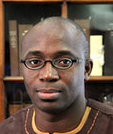By Bob Allen
A Liberian Baptist leader celebrated the World Health Organization’s declaration that the country is Ebola-free, making it the first of the three hardest-hit West African nations to bring the epidemic to a formal end.
“Forty-two days have passed since the last laboratory-confirmed case was buried on 28 March 2015,” the WHO said in a statement May 9. “The outbreak of Ebola virus disease in Liberia is over.”
 Olu Menjay, president of the Liberia Baptist Missionary and Educational Convention, attended a May 11 WHO ceremony in Monrovia alongside dignitaries including the presidents of Liberia and Togo.
Olu Menjay, president of the Liberia Baptist Missionary and Educational Convention, attended a May 11 WHO ceremony in Monrovia alongside dignitaries including the presidents of Liberia and Togo.
Menjay, president of Ricks Institute, a K-12 boarding school with informal ties to U.S. Baptists who identify with the Cooperative Baptist Fellowship, thanked partners, friends and individuals who helped with numerous challenges during the last year.
“You particularly reminded us during the raging storm of Ebola that you care,” Menjay said in an email May 12. “We say thank you!”
While “grateful and joyful” that the worst of the crisis is past, Menjay acknowledged that challenges still linger. “The challenges of poor health care services, poor hygienic conditions, increased orphan crisis and deplorable economic conditions continue to confront us,” he said. “We are resolved to remain prisoners of hope to work on these challenges.”
Menjay noted that the Ebola virus is not totally eradicated in Liberia until it is also gone from the West African region, especially Guinea and Sierra Leone.
“We stand in solidarity and prayers with our sisters and brothers in Guinea and Sierra Leone,” he said. “Even though significant progress has been made in Guinea and Sierra Leone in fighting the deadly disease, we stand in prayers with our neighbors and partners as we all together work diligently in eventually eliminating the deadly Ebola virus in West Africa.”
The Ebola outbreak in Liberia was the largest since the disease first emerged in 1976. When transmission peaked last August and September, the country was reporting 300 to 400 news cases each week.
“During those two months, the capital city Monrovia was the setting for some of the most tragic scenes from West Africa’s outbreak,” according to the WHO report — “gates locked at overflowing treatment centers, patients dying on the hospital grounds and bodies that were sometimes not collected for days.”
“Flights were cancelled. Fuel and food ran low. Schools, businesses, borders, markets, and most health facilities were closed. Fear and uncertainty about the future, for families, communities, and the country and its economy, dominated the national mood.”
Though Monrovia was hardest hit, the WHO reported, every one of Liberia’s 15 counties eventually reported cases, and at one point some expressed concern the virus might become endemic in Liberia.
“It is a tribute to the government and people of Liberia that determination to defeat Ebola never wavered, courage never faltered,” the WHO said. “Doctors and nurses continued to treat patients, even when supplies of personal protective equipment and training in its safe use were inadequate. Altogether, 375 health workers were infected and 189 lost their lives.”
“Local volunteers, who worked in treatment centers, on burial teams, or as ambulance drivers, were driven by a sense of community responsibility and patriotic duty to end Ebola and bring hope back to the country’s people. As the number of cases grew exponentially, international assistance began to pour in. All these efforts helped push the number of cases down to zero.”
Liberia’s last Ebola victim was a woman in the Monrovia area who developed symptoms on March 20 and died a week later. A total of 332 people were identified as being exposed to the patient, but none developed symptoms.
Health officials have continued to search for new cases. During April five laboratories dedicated to Ebola tested about 300 samples every week, and all test results were negative.
